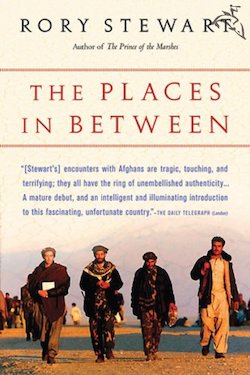Published by Mariner Books / Harper Perennial / Picador, 2004, 400 pages.

Rory Stewart had set out to walk from Iran all the way to Nepal—through Afghanistan, Pakistan and India. But in December 2000, when the Iranian government took away his visa, the Taliban refused to allow him to enter Afghanistan. So Stewart had to go directly to Pakistan. At the end of 2001, when he heard that the Taliban had fallen, he decided to return to Afghanistan and walk from Herat in the west of the country to Kabul. He took a shorter route through the mountains, even though it was during the middle of winter.
However, before he can begin his journey, Stewart has to explain to the Afghan Security Services why he is walking across the country and reassure them that he is not spying for the UK government. “It is mid-winter—there are three meters of snow on the high passes, there are wolves and there is a war”, the man from the Security Services tells him. “You will die, I can guarantee. Do you want to die?” Stewart is finally allowed to continue, but only on condition that two men from the Security Services accompany him for part of the way. Stewart knows that it would not go down well in the villages where he would be spending the nights, but there is nothing he can do about it.
This is a fascinating account. Stewart is always aware of the juxtaposition of history with the present. Herat, once “a great medieval market for China, Turkey, and Persia…was now selling Chinese alarms clocks, Turkish sunglasses and Iranian apple juice”. Throughout his book he quotes the Baburnama—written by the first Mughal emperor, Babur, about his journey from Afghanistan to India in the early 16th century—thus connecting Babur’s time with ours.
Stewart is not always welcome in the villages. War has led to a mistrust of strangers. Fortunately, he speaks enough Dari (one of the Afghan languages) to hold conversations with the men he meets (and it is almost always men). He speaks with Afghans who fought in the wars that began in the late 1970s, first during the Russian invasion and then during the civil war.
Politics in Afghanistan is never straightforward. The headman of a village he stays in had been a military commander for 24 years, first fighting the Russians with a group funded by Pakistani intelligence and then with a group funded partially by the British. “Then the Russians withdrew and he fought the pro-Russian Najib government and the rival Northern Alliance groups. When the Taliban took over the province five years earlier, he decided, he said, to ‘retire from fighting’. This probably meant that he had been the Taliban commander in the area but would deny it if I asked him.”
Eventually, the two security men leave Stewart, but he acquires a new friend—a dog the size of a small pony, given to him by villagers, whom he names Babur. Man and dog then help each other through blizzards and snow drifts.
And then there is the landscape, which changes all the time, from deep snow on the mountains to this: “We walked on through hills whose brilliant colours showed metal ores in the soil: a rock face striped like candy, a crest of snow-softened russet, then slopes of green and orange sandstone, and finally, a cliff streaked with bull’s blood red.”
This book is important, coming at a time when the world knows so little about Afghanistan excerpt for the wars and the bombings.
I lived in Afghanistan as a child in the early 1970s, before the Russians invaded. My memories are of a beautiful, rugged country and a warm and hospitable—and fiercely independent—people. But the scars left by decades of war are going to take a long time to heal. There were times in this book when I could barely recognize the country I had known.
The walk across Afghanistan really brings home just how diverse the country and its people are: the various tribes, languages and landscapes. Stewart does not romanticize any of this but tries to portray the country and its people with honesty and empathy. I just hope that this magnificent land will find peace someday.
See also The Favored Daughter: One Woman’s Fight to Lead Afghanistan into the Future.

This is a gorgeous review, Suroor.
Call it coincidence, I’ve just read A Thousand Splendid Suns by Khaled Khoseini, which I did enjoy, for various reasons, the main one being that he gave a voice to Afghan women in his novel.
I was born in 1966. Like you, I have seen the Berlin wall fall down, I have seen the end of Yougoslavia, I have been struck with horror at the stoning of women in Kabul.
We have seen too many wars happening in too many countries.
Like you, I do hope for peace.
Thanks, Sophie. Yes, it is appalling what is happening in so many parts of the world. But I hope that this will pass and humanity will look back at this time and wonder why we had allowed things to get so crazy.
Pingback: The Favored Daughter—One Woman’s Fight to Lead Afghanistan into the Future: Fawzia Koofi with Nadene Ghouri – Talking About Books